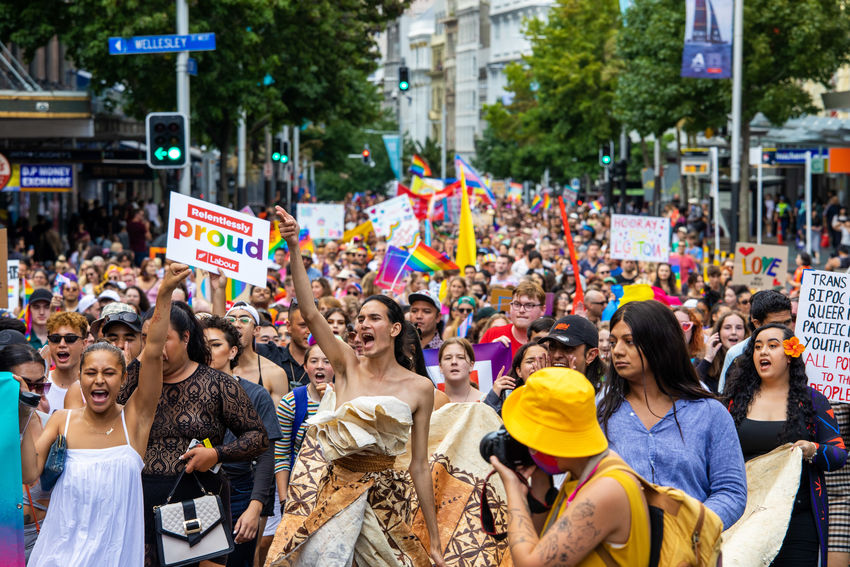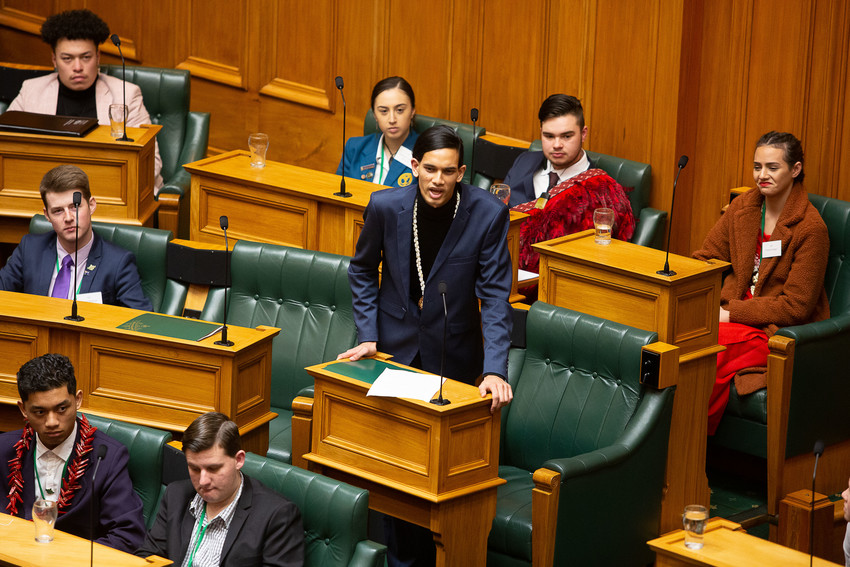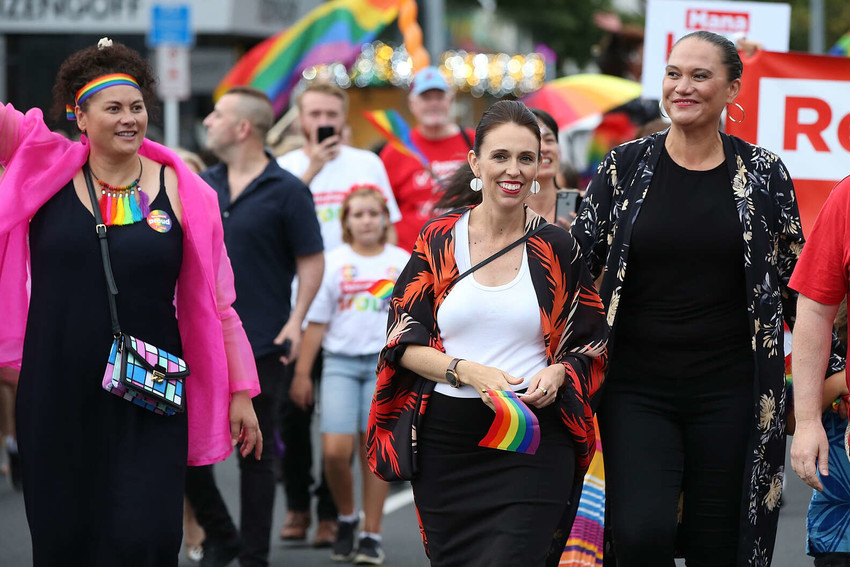Pacific MPs Come Together to Ban Conversion Therapy

by Shaneel Lal
I was born in Vakasalewalewa and Hijra in Fiji, a colonised Christian Island. My community knew I was queer before I did; I carried myself in the fashion of a woman. My community was given a choice between the church and their child. I wish they had seen the broken heart of a child and chosen me. I cannot describe the excruciating pain a child feels when they are rejected by the only people they've ever known and loved.
After five long years of activism, New Zealand banned conversion therapy on the 15th of February. I will always remember this day as a win for indigenous peoples. Before colonisation, queer people were integral to indigenous communities, playing a role in raising children, cleaning the house, caring for the elders, and doing things indigenous peoples relied upon to survive. However, the unholy marriage of colonisation and Christianity violently ripped through the fabric of our culture, supplanting the love, celebration, and acceptance of indigenous queerness with homophobia, transphobia and queerphobia.
The fight for decolonisation is also felt by Green MP Teanau Tuiono. “We have to shake off the yoke of colonisation and reindigenize our relationships with each other and our island homelands,” Tuiono told me.

All Pacific Island Members of Parliament voted in favour of banning conversion therapy. The resounding support by Pacific leaders to end conversion therapy sends a message to queer Pacific people - we are loved. The Pacific community has come a very long way from the times of the Homosexual Law Reform and the Marriage Equality Bill. Minister of Pacific Peoples Aupito Williams Sio, who voted against same-sex marriage, had a change of heart and decided to support a ban on conversion therapy.
"I am following my heart, and in this case, I want to see our Pacific communities thrive and prosper, including the Pacific rainbow plus community... They are members of our families. As leaders of our families, we must constantly reach out and build bridges of understanding and respect one another's human rights," Minister Sio told the Herald.
Pacific MPs are put under a microscope whenever New Zealand debates a law that brings our morality to the forefront. A majority of people who voted against banning conversion therapy were white men. Five of eight people who voted against banning conversion therapy were white men. The media is yet to label white men 'conservative' and 'backwards'. However, Pacific leaders who've voiced opposition to queer rights in the past have been criticised mercilessly. The mainstream media throws rocks at our leaders in their weakest moments, so I want to shower them with roses in a moment of progress and unity. I am not trying to justify past acts of homophobia and transphobia. I am celebrating our community breaking free from the shackles of colonialism.

The Pacific MPs have been there from the beginning. In 2018, Hon. Jenny Salesa appointed me to be her Youth MP and gave me an opportunity to take the fight to ban conversion therapy to Parliament. It was my speech at Youth Parliament that was the catalyst for change. If it weren't for her belief in me, the movement to ban conversion therapy would not be where it is today. Hon. Salesa says that the "Labour Pasifika Caucus, indeed all my Labour Party colleagues, have supported this Bill throughout not only as a way of protecting the rights of our rainbow whānau but as a supportive way to open and respectful discussion about gender identity, sexual orientation, and gender expression. I am proud of my Pasifika colleagues, their understanding, compassion and strong stance for justice."
The Conversion Practices Prohibition Legislation Bill was introduced to the House of Representatives by the Minister of Justice Kris Faafoi, a Tokelauan MP. In his speech at the third reading of the Bill, Minister Faafoi acknowledged his late father, who in the 1980s was a member of the Pacific Islands AIDS trust. He said his Father "made sure that we were standing up for the gay community within the Pacific Islands community, to make sure that they were supported. That kind of advocacy from my parents made sure that when I'm asked about legislation that I'm very proud to have voted for in this House, it's the vote in 2013 around marriage equality and this piece of legislation here today."
Despite the changes in law, some hearts and minds remain the same. Conversion therapy has been banned, but some families will continue to struggle to understand their queer children and family. Barbara Edmonds sharing that she recently lost someone very dear to her, said that "there is a moment of clarity that one experiences when you watch someone you love be lowered into their grave. At that moment, it becomes very clear to you who you want to stand beside you, who you want to hold your hand and who you want to hold you as you cry a thousand tears. That moment is very similar to the immediate moment that happens once you've given birth to a child and you hold them for the first time. These moments of pure love are sometimes the most vulnerable moments we as human beings will ever experience."

"The 'who'. The who that you chose to share your most vulnerable moments with, moments of pure and safe love with, should never be dictated by anyone else but yourself."
Talking to the Pacific MPs, my heart filled up with grief for all the love I never received from my community because they were too scared their display of love for me would encourage my queerness. The elders tried to free me from the evil spirits that made me queer through prayer. I was expected to wear enchanted bracelets. I was kept away from the boys to stop the spread of my queerness and the girls to stop me from becoming queerer. My queerness was treated like a virus, if not an evil spirit. My conversion therapy isolated me. It broke me. I experienced conversion therapy as a challenge to my indigeneity. Conversion therapy severed my ties with my ancestors.

Terisa Ngobi is the mother of a rainbow child, and she told me that "as parents, we only want to see our babies happy, so it shouldn't matter what your preconceived thoughts are on what that looks like for your child; so long as they are happy… I am also an active Catholic. I would remind my brothers and sisters in Christ… that it's our job as God's children to love and protect one another. That includes [protection] from any torture and pain like conversion therapy. God said 'Love thy Neighbour' not unless they are LGBTQ+ - Just 'Love thy Neighbour'."
A fight for queer rights is a fight for indigenous rights. Decriminalising homosexuality was an act of decolonisation. Accepting and restoring indigenous queerness is an act of re-indigenising. Ending conversion therapy is ending the colonial erasure of indigenous queerness. The Pacific community has a long way to go, but our leaders give me hope for our future.

I leave you with the words of Minister Poto Williams.
"The passing of this Bill is so important because it enshrines in law that we can be whatever we want to be, love whomever we want to love and express our sexuality in whatever way makes us happy. No one has the right to try and fix us because we are all perfect just the way we are!"
